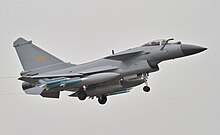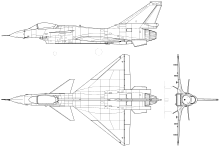Chengdu J-10
| Chengdu Jian-10 | |
|---|---|
 J-10A with AL-31FN turbofan |
|
| Type: | Multipurpose fighter |
| Design country: | |
| Manufacturer: | |
| First flight: |
March 23, 1998 |
| Commissioning: |
2006 |
| Production time: |
In series production since 2003 |
| Number of pieces: |
400+ |
The Chengdu J-10 (Jian-10) is a single-engine, all-weather, multi -role fighter of the Chinese Air Force developed and built by Chengdu Aircraft Corporation (CAC). Within NATO , this machine is also referred to as the “Vigorous Dragon”, whereas the manufacturer Chengdu uses the designation “F-10 Vanguard” (German: “Vanguard”) for the export market. The only export customer to date, Pakistan, uses the abbreviation “FC-20”.
history
The program began in the early 1980s to counteract new combat aircraft from other countries with something of equal value. Originally developed as a pure interceptor, the capabilities were later expanded to include air-to-ground missions.
Since the aircraft was designed and developed under high secrecy, many details are unknown. The first flight of the J-10 (Jian-10) took place in 1996, but the program suffered a setback in 1997 due to a serious accident. The design was then changed and the new prototype flew on March 23, 1998 to continue the test program. The first pre-series model took off on its maiden flight on June 28, 2002. In 2004 the aircraft was finally put into service by the Air Forces of the People's Liberation Army (PLAAF). Currently five regiments are to be equipped with a total of 250 single-seat and 120 two-seat machines.
The J-10 was only offered to Pakistan for export. In April 2006, the Pakistani government announced that it would put 36 J-10s into service under the designation FC-20 .
On November 4, 2008, two PLAAF J-10A's were exhibited at the 2008 Zhuhai Airshow. Both aircraft were painted gray, numbered yellow and equipped with non-retractable refueling nozzles. The J-10A showed the audience maneuvers such as an almost vertical ascent immediately after take-off, 360 ° turns and curves.
J-10B
On January 9, 2006, Jane's Defense Weekly reported that an advanced version of the J-10 with a more powerful engine, thrust vector control , reinforced airframe and an active electronically scanned array radar was being planned ( Super J-10 ). This variant presumably started its maiden flight in December 2008, and in March 2009 photos appeared on the Internet for the first time. They show a modified air inlet (diverter-less supersonic inlet, as in the F-35 ) for the engine. In addition, the machine is to have a fire control system with a wide-angle HUD modeled on the MiG-29 as well as infrared and laser-based target sensors , which are difficult or impossible to locate in comparison to radar target detection. The machine thus developed into a multi-purpose fighter. On the tip of the tail fin there is to be a system for disrupting enemy tracking systems and sensors above the engine to detect approaching missiles. Around 50 machines are now expected to be in use.
construction
The J-10 is a one or two-seat fighter aircraft with delta wings and canards just behind the cockpit. It is a Russian AL-31-FN - turbofan engine of NPO Saturn driven. The aircraft has a conventional vertical tail. The almost rectangular air inlet is located under the fuselage. The aircraft consists to a large extent of composite materials, and the pilot sits in a teardrop-shaped cockpit. The performance data is roughly the same as that of an F-16 , the agility of the J-10 is probably better. A KLJ-3 (type 1473) is used as the radar.
In November 2005 Russia delivered the first AL-31FN engines, the second delivery took place in mid-2006.
At the moment, however, China is developing its own engine, the WS-10A Taihang with 132 kN thrust, which may be used in later J-10 versions.
In the summer of 2010, the Chinese Ministry of Defense invited 51 diplomats to Yangcun near Beijing to inspect the J-10 up close. According to Chinese information, the engine shown came from our own production. The first recordings of a J-10B in flight equipped with the Chinese WS-10A Taihang engine were made public in August 2011.
A J-10B with thrust vector control was demonstrated at the Zhuhai Airshow in China in mid-November 2018 .
Avionics
A digital, quadruple redundant fly-by-wire system supports the pilot during the flight. Information is shown on three multifunctional liquid crystal displays. The structural design also includes HOTAS .
The J-10's radar equipment is unknown; possible candidates are the Russian RP-35, the Israeli EL / M-2035 or the Chinese JL-10A. Electronic interference equipment is available.
Versions
- J-10AS : prototype
- J-10 / J-10A : single-seat multi -role fighter , basic model
- J-10S : two-seater for training purposes and - possibly - ground attacks
- J-10SY : Two-seater for the August 1st aerobatic team of the Chinese Air Force
- J-10B : advanced model
- J-10C : Further development of the J-10B with a new AESA radar and PL-10 and PL-15 air-to-air missiles
Users
- 36 FC-20s ordered in November 2009 (with an option for 150 more machines)
Incidents
On November 12, 2016, 30-year-old Chinese Yu Xu, one of the first four J-10 fighter pilots, died during flight training for the Chinese Army's aerobatic team . After getting out of the ejector seat, her parachute was hit by the wing of a subsequent aircraft. Your copilot, who also got out of the boat, survived.
Technical specifications
| Parameter | Data |
|---|---|
| Type | Multipurpose fighter |
| crew | 1 pilot (2 in the S version) |
| length | 16.43 m |
| span | 9.75 m |
| height | 5.73 m |
| Wing area | 45.50 m² |
| Wing extension | 1.69 |
| Wing loading |
|
| Empty mass | 9,730 kg |
| Max. Takeoff mass | 19,277 kg |
| Load factor | −3 / + 9 g |
| Top speed |
|
| Service ceiling | approx. 18,000 m |
| Use radius |
|
| Transfer range | 2,540 km |
| Max. Gun load | 7000 kg |
| Engine | a turbofan engine Saturn / Ljulka AL-31FN or a Woshan WS-10A "Taihang" |
| Thrust |
|
| Thrust-to-weight ratio |
|
Armament
The J-10 has eleven external load stations for up to 7000 kg of weapons and equipment (external tanks, ECM). The aircraft is equipped with a 23 mm automatic cannon equipped. For air combat, the J-10 usually carries IR guided missiles such as the PL-8 or PL-9 at visual range, the PL-11 (semi-active, comparable to AIM-7 Sparrows ), and the newer PL-12 (fully active, comparable with AIM-120A / B AMRAAMs ) for medium and long range. For ground combat, the J-10 can carry unguided and laser-guided bombs as well as anti-ship missiles .
- Fixed guns
- 2 x double-barreled 23-mm automatic cannon Type 23-3 with 200 rounds of ammunition
- Gun loading of 7,000 kg at eleven external load stations
- Air-to-air guided missile
- 6 × start rails for one CATIC PL-8 each - infrared- controlled for short distances
- 6 × start rails for one EOTDC PL-9 each - infrared controlled for short distances
- 6 × start rails for one PL-11 each - semi-active, radar-guided for medium-haul routes
- 4 × start rails for one CATIC PL-12 each - radar-guided for medium- haul routes
- Air-to-surface guided missile
- 2 × launch rails for one Hongdu YJ-91 each ( copy of the Ch-31 ) - radar-guided ship target
- 2 × launch rails for one PJ-9 each - passive anti-radar guided missile
- Guided bombs
- 6 × Luoyang / CASC LT-2 (laser-guided glide bomb; 570 kg)
- 8 × Luoyang / CASC LS-6 (satellite navigation (GPS) -guided 250 kg glide bomb)
- External container
- 3 × drop-off additional fuel tank with kerosene
literature
- Andreas Rupprecht: Chengdu J-10 (Focus Aircraft). In: International Air Power Review. Vol. 22, pp. 40-59, ISSN 1473-9917 , AIRtime Publishing, 2007.
Web links
- Chengdu J-10 (Jian-10 Fighter aircraft 10) / F-10 (English)
- Presentation of the Jian-10 with pictures at the 7th China International Aviation and Aerospace Exhibition held in Zhuhai (Chinese / English)
- J-10 Multirole Fighter Aircraft (English)
- Official J-10 video on YouTube (Chinese)
- Pakistan Air Force to get 36 of these J-10s on YouTube
Individual evidence
- ↑ [1]
- ↑ International Institute for Strategic Studies : The Military Balance 2014. p. 236.
- ↑ International Institute for Strategic Studies: The Military Balance 2014. p. 235.
- ↑ Sino Defense: The chronological history of the J-10 programs. ( Memento of November 14, 2015 in the Internet Archive ) Retrieved August 8, 2015
- ↑ FliegerRevue May 2008, pp. 22–23, Chengdu J-10B exposed
- ↑ FliegerRevue 09/2015, p. 61, Chengdu J-10A
- ↑ Johnny Erling: Fighter jets from our own production. In: Rheinische Post from August 16, 2010, page C8
- ↑ FliegerRevue September 2011, p. 8, J-10B with a new engine
- ↑ China's stealth fighters show off missile payload
- ^ New Chinese Weapons Seen On J-10C Fighter. In: AINonline. July 20, 2017, accessed May 21, 2018 .
- ↑ Accident during training flight: Chinese fighter pilot dead orf.at, accessed November 15, 2016.
- ↑ Bai Tiantian, First female J-10 stunt pilot dies in crash , in: Global Times , November 14, 2016, pp. 1–2.



